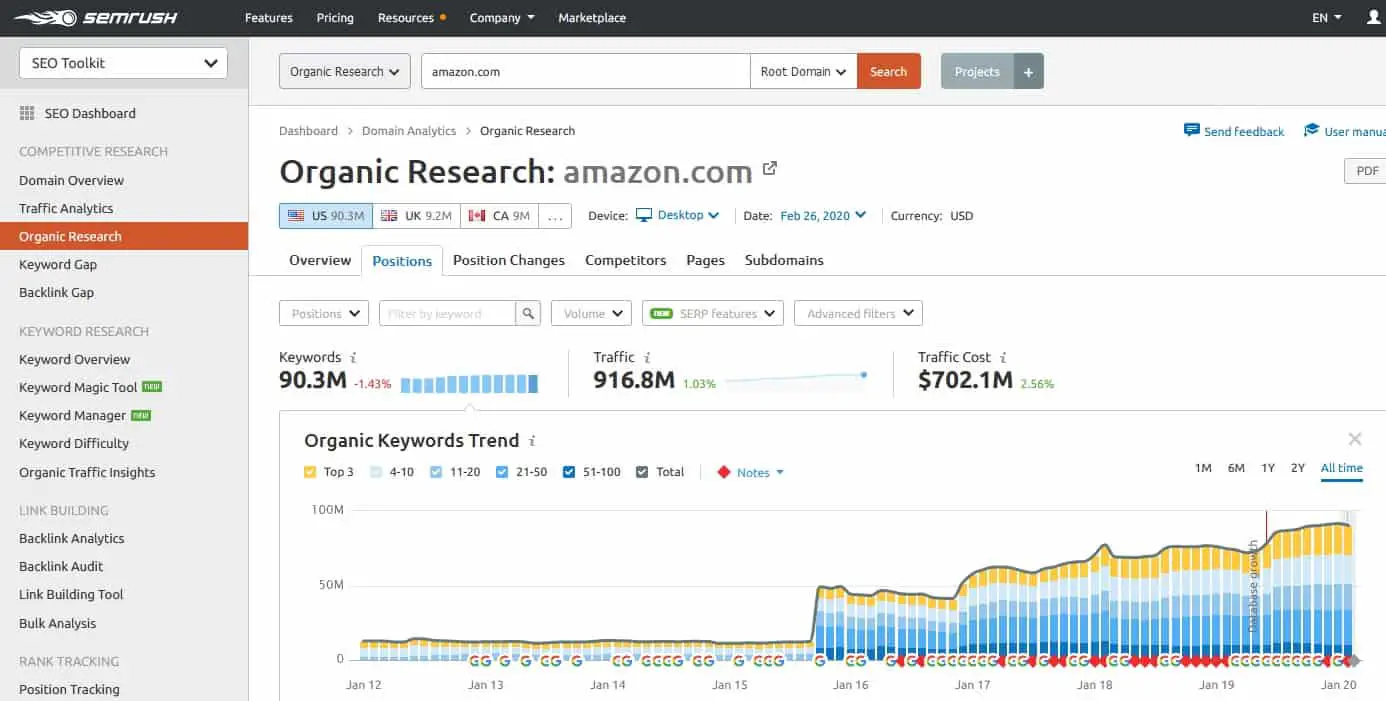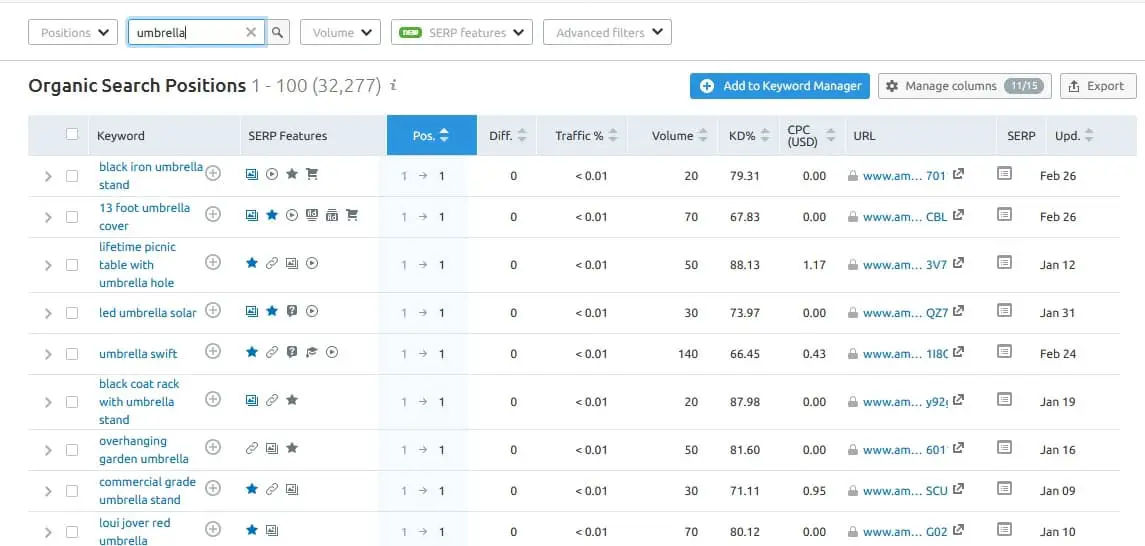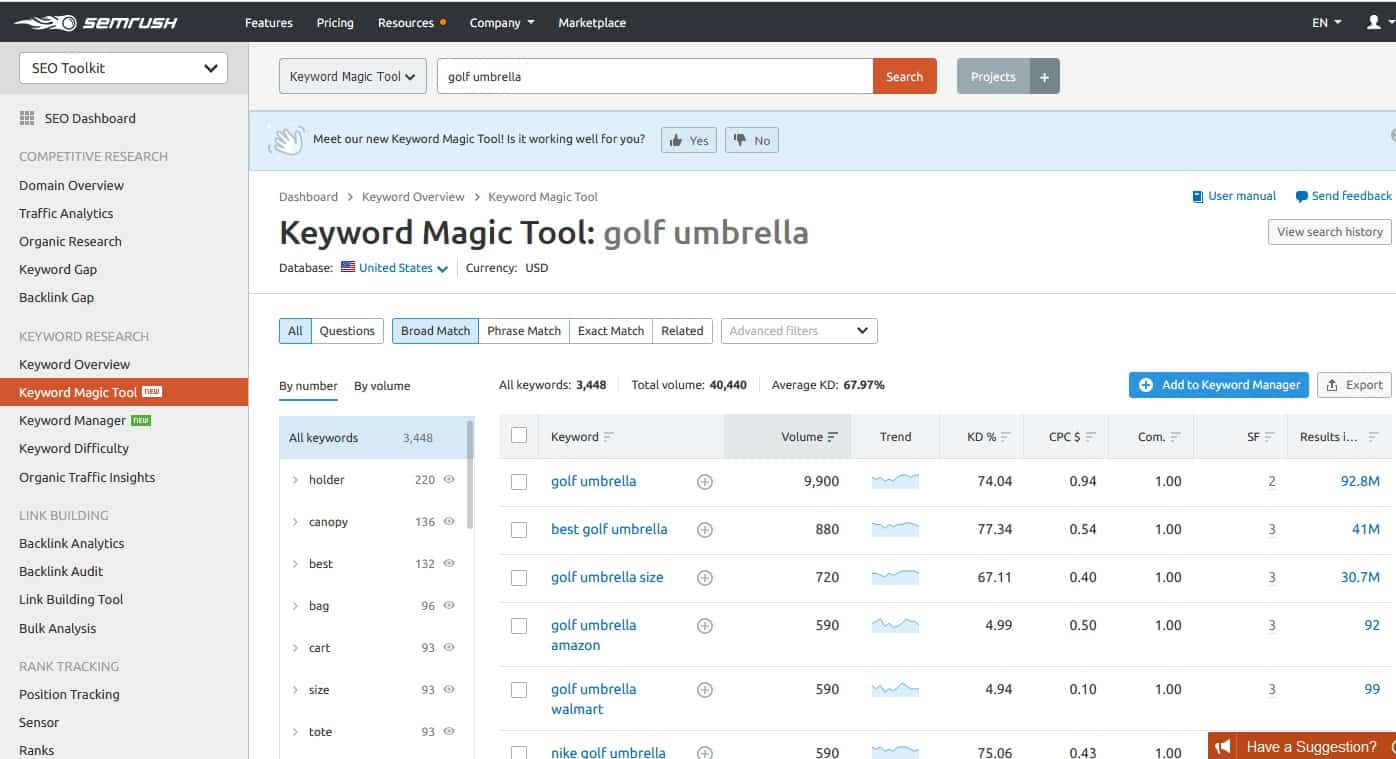Finding the Best Tools for Keyword Research
Do you own an E-commerce business and want to get more sales? If yes, then you should focus on using the right keywords. When getting organic traffic, proper keyword research is one of the most important things. The right keywords won’t only increase your traffic but will also improve your website’s ranking. The problem is that most people don’t know how to research keywords properly. So, if you want to improve keyword research, this article is beneficial. In this, you will get tips to help you dominate your eCommerce keyword research. So, if this sounds compelling, then keep reading.
So you have an e-commerce website and online shop. How do we get more traffic?
In the first step, you need to do an analysis.
Let us start – Type your online shop URL below:
If you want to, Try to use the SEMRUSH tool for seven days with all the powerful features!
Keyword research is one of the most powerful tools for optimizing your business and eCommerce webpage. Once you are aware of the most powerful keywords, keyword research can help you create content. Keyword research is the first step in creating a solid eCommerce page. Like all other ventures, a solid foundation sets the path for progress. Finding the right keywords to use for your eCommerce site will enable you to drive as much traffic to your webpage as possible.
How to do Keyword Research for eCommerce?
E-commerce keyword research can be done using the following steps:
- Use the Semrush Keyword Magic tool to generate an eCommerce website keywords list
- List all keywords related to your website or topic that you want to write.
- Extract all keywords with high volume and low competition (low KD%).
- Pick keywords that you want to use for writing articles or for an eCommerce website advertising
eCommerce Keyword Research Example
For example, your website is amazon.com, and you sell umbrellas.
First, go to the Organic research option and see the basic stuff:

You can see all organic keywords from your website (or your competition) and statistics here.
Let us see for the word “umbrella” stat “sticks be “ow:

Now, you can see several things, but “the most important ones are :
Volume: is this keyword popular?
KD: How is it difficult to rank? If KD is 100, it is tough to rank for; if it is 0, it is easy.
Find high-volume keywords with low competition.
Keyword research for eCommerce can be categorized into search volume, ranking difficulty, and search relevance. These are the top three categories to focus on optimal keyword research.
Search volume is the number of users currently searching for a specific term. For example, the search volume will be greater if a keyword is viral. For this reason, eCommerce webpages need to consider this when building a site. It is also important to note that there are free keyword research tools. These free keyword tools compile the search volume statistics on popular keywords. High search volume is also essential when determining the competition for that specific keyword. For example, when a keyword is viral, it will inevitably be more competition. This can workwebpage’spadvanwebpage’sisadvantageantage based on how relevant the site is. Sites with more traffic will have the upper hand when using more pokeyworwebpagesyage’sy and rank higher on search engines. The consensus is that if a keyword has more than 20 searches per month, it is worth considering. This is a good rule of thumb as it helps ensure that searches are productive and relevant.
Ranking difficulty is a concept that involves how difficult it is for a page to be seen by other domains with more power. For example, a trendy website will likely be viewed more than a start-up webpage. This is due to natural buzz and relevant traffic over some time. There is a high-quality tool that can be used to help make this process easier. The tool is known as Ahrefs. Ahrefs is a keyword search tool that helps to rank overall domain authority. The tool uses backlinks to help rwebpage’spplacewebpage’sothersother similar sites. For sites that are brand new, it is easier to play it safe. Simpler keywords work best for brand-new sites. The domain webpages are measured on a logarithmic scale.
Search relevance is also at play here. Search relevance determines if the keyword that works best for your site in terms of availability will be in the same category aspage’spage’s content. For a page example, find a keyword you feel confident in. You must ensure that it relates tosite’ssite’s contentsite’ssite’s users will be alarmed by a page if your keyword does not relate tosite’ssite’s information, and it will not help you build a solid reputation. For this reason, it is essential to diligently research each key keyword before adding it to your eCommerce site.
Optimization for Success (Keyword Research for E-commerce)
The next step is to determine which pages of your site should be used for optimization. Almost all eCommerce sites would agree that the home page and product pages are undeniably the most popular. For this reason, many content creators assume this is where the keywords should be placed. However, this is not always the case. Keywords can be placed on blog pages, category pages, and images. This adds to the more significant chance users will find your webpage. It is essential to expand the places where keywords fit. By only using home and product pages, you limit yourself to the traffic you will receive over time.
Semrush has one excellent tool: Magic Keyword, where you can type a word and get search volume and keyword ideas.
Let us suggest you want to see” l a “golf umbr” lla.”
Type th” in”

You can see all the questions, terms, and ideas. Now, you need to find the high-volume and low-competition keywords.
Tips to Ensure Success for Relevant Sear” he
“Another major tip is to use keyword ranking tools to document and track success. By monitoring your process based on relevant searches, you can gain a broader perspective of the best way to advance. Webpages can be connected to Google Search Console. This free service provides data for your web page and other essential benchmark statistics. Tracking your site’s progress is the first step for optimizing your page and business.
Another tip commonly used today is to view what your competitors are doing. For example, if your domain competitor uses specific words, it is advised to check out which ones they are using and how many searches those keywords receive in a given amount of time. The main reason for doing this is to learn from what other competitors are doing and find new and creative ways to rank higher. You are also advised to check where their backlinks are coming from. For example, if they receive a lot of buzz around their page, there has to be a reason for it. Researching their backlinks can also spark ideas for guest posts. Collaboration is a solid tool for increasing relevant searches and buzz around your page.
The final tip is to use a long-tail keyword. Using longer keywords, you are less likely to be stuck in high-volume searches of broad and generic content. Some may argue that these keywords are less popular and will not be searched for as much; however, users searching for these words know precisely what they are looking for. This is not always the case for other searches. Users searching for broad and generic terms can be swayed in many different directions once the search results pop up. It is essential to use long-tail keywords to avoid this confusion and loss of focus. Using cost per click (CPC) for popular keywords can also prove to be a valuable tool. Long-term success for any eCommerce webpage is cultivated by combining all these unique and innovative strategies.
If you want to, Try to use the SEMRUSH tool for free for seven seasons, with all the powerful features!
5 Tips for Dominating Your Ecommerce Keyword Research
1- Study Your Competitor
One of the best ways to get better keywords is by researching your competitors. With this method, you can easily find keywords that are profitable and already tested. However, focusing on competitors and using some tricks to get data is impossible. The best way to do this is by using Keyword Planner. This keyword-researching tool gives you its feature ideas and ors’ors’as of any URL. You can put your compcompetitor’soURcompetitor’sol get all the keywords he uses to get traffic.
2- Understand You Customers
If you want to get better results with any online business, you must learn to understand your competitors. You have to understand their search intent to get keywords that will bring them to your website. Observe what words your customers use to talk about your products and brand. The best way to do that is by running surveys and conducting interviews.
3- Use Pinterest Promoted Pins
For most people, Pinterest is just an image-downloading website, but if appropriately used, it can provide hundreds of unique, fantastic ideas. Pinterest focuses more on sales and retail than other social media platforms, making it an excellent platform for searching for authentic keywords. You can use your Pinterest business account to find new keywords for the promoted pins. This method will give you the main keywords and help you find other related keywords.
4- Use Google
If you are completely new to the business and don’t have any don’tiedon’tciencen, sdon’tienconscienceneywordhresearchogle. Now won’t you might be thiwon’t, ‘How can Google help?” You have to visit Go’gle and start typing about your product; then, G. Googletomatically shows your questions on how to complete a query. To get better results, limit your search to 3 to 4 words. This way, Google will only show you the main keywords people are searching for.
5- Refine Your Keywords
Once you have a list of all the keywords, you should not use them immediately. Before incorporating them into your business, you must check them using a keyword tool. Refining your selected keywords is important as it will help you get the best. Many keyword tools are available, but choose a reputed one to get the keywords accurate. Here, your main goal is to get the search volume of the keywords. The keyword tool will also show you other long-tail keywords related to the parent keyword. After getting the metrics, keywords quickly and sate the w with reasonable searches and low competition.
Conclusion
So, these were some of the best tips to help you get better at keyword research. The best way to find great keywords is by understanding your customers. It will help if you start by identifying what your customers are searching for. If you are confused about what to do, you can also use DSA campaigns and let Google do all the work. Another great way is by spying on your competitors. If you have just started your keyword researching journey, then you can analyze your comcompetitor’scdaccompetitor’sidacompetitor’skeywordsey are using. I hope this article will clarify some of your queries and give you valuable information.



